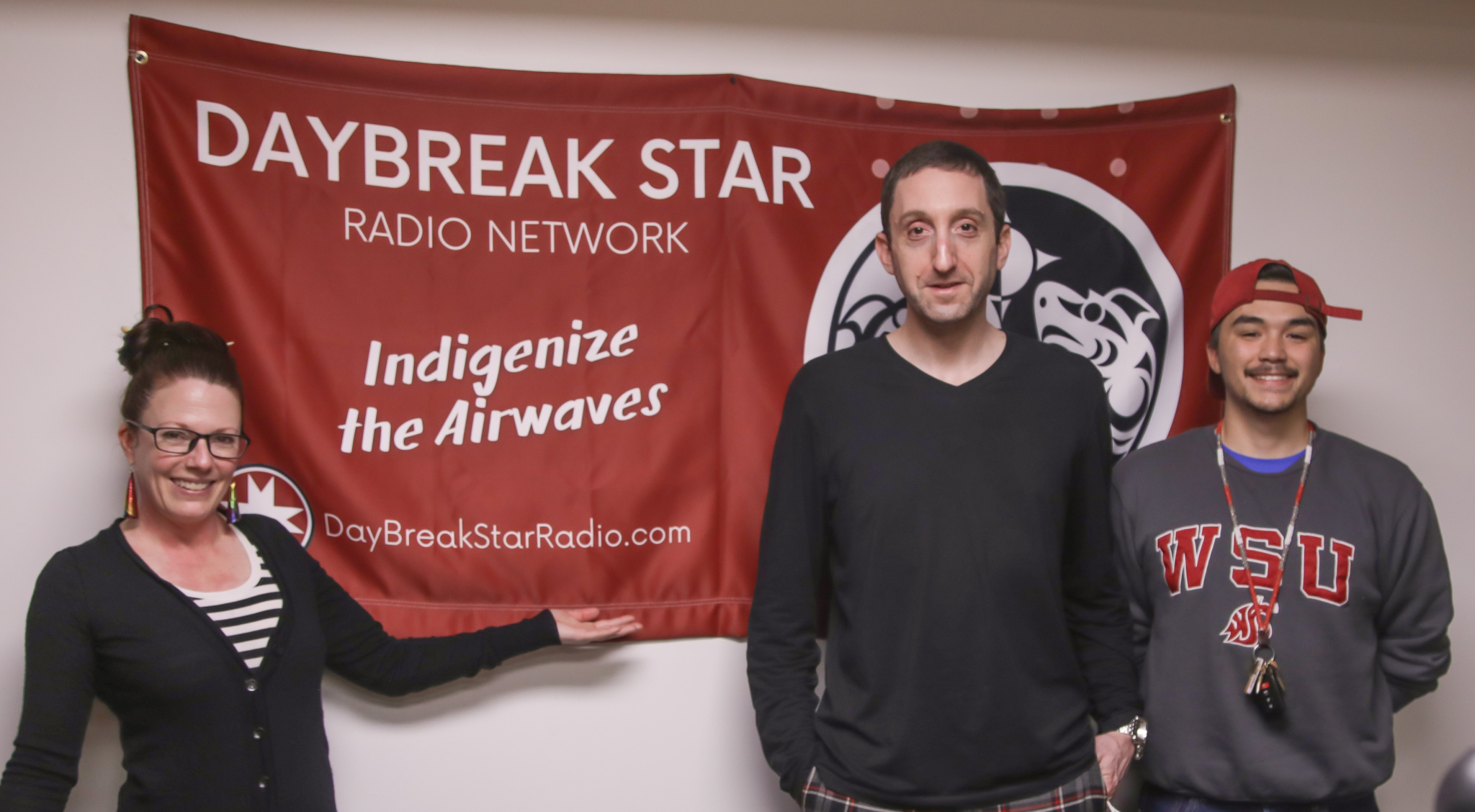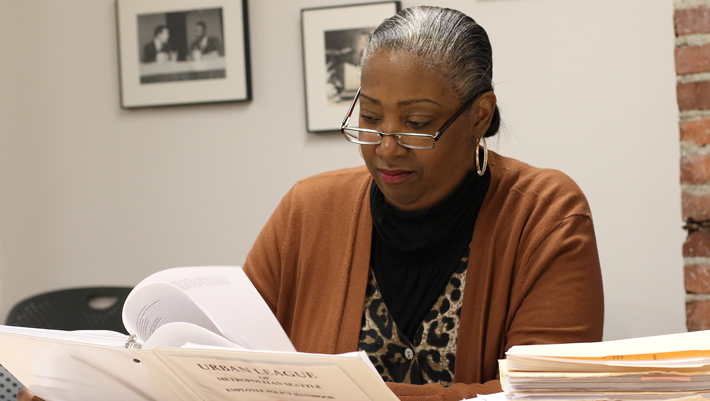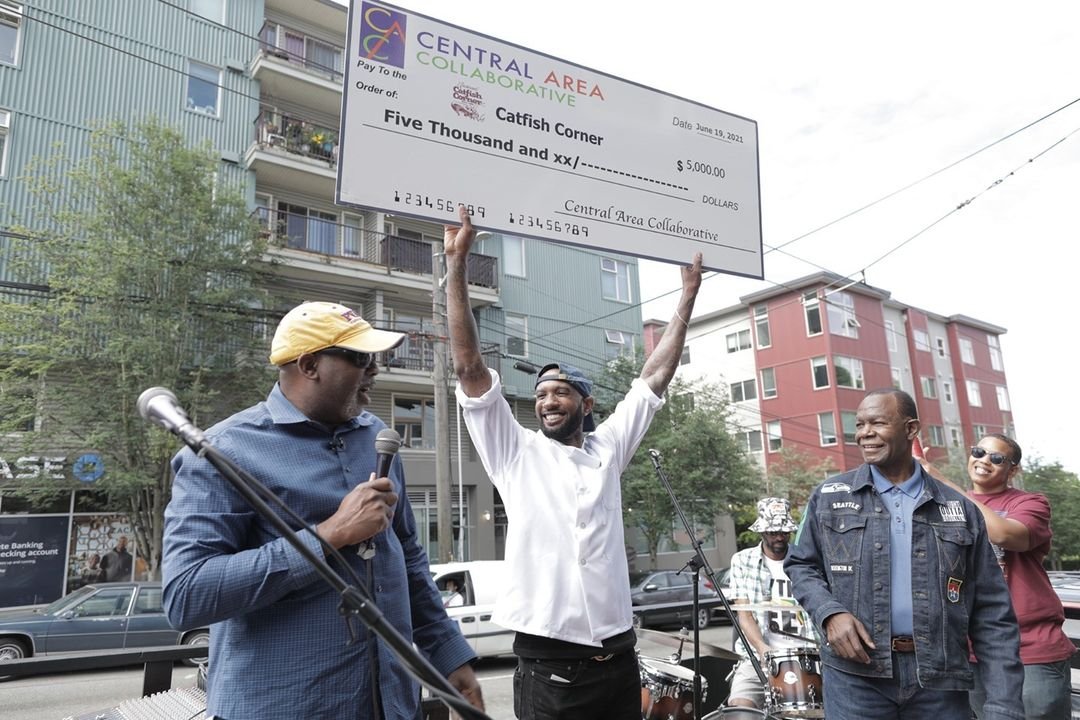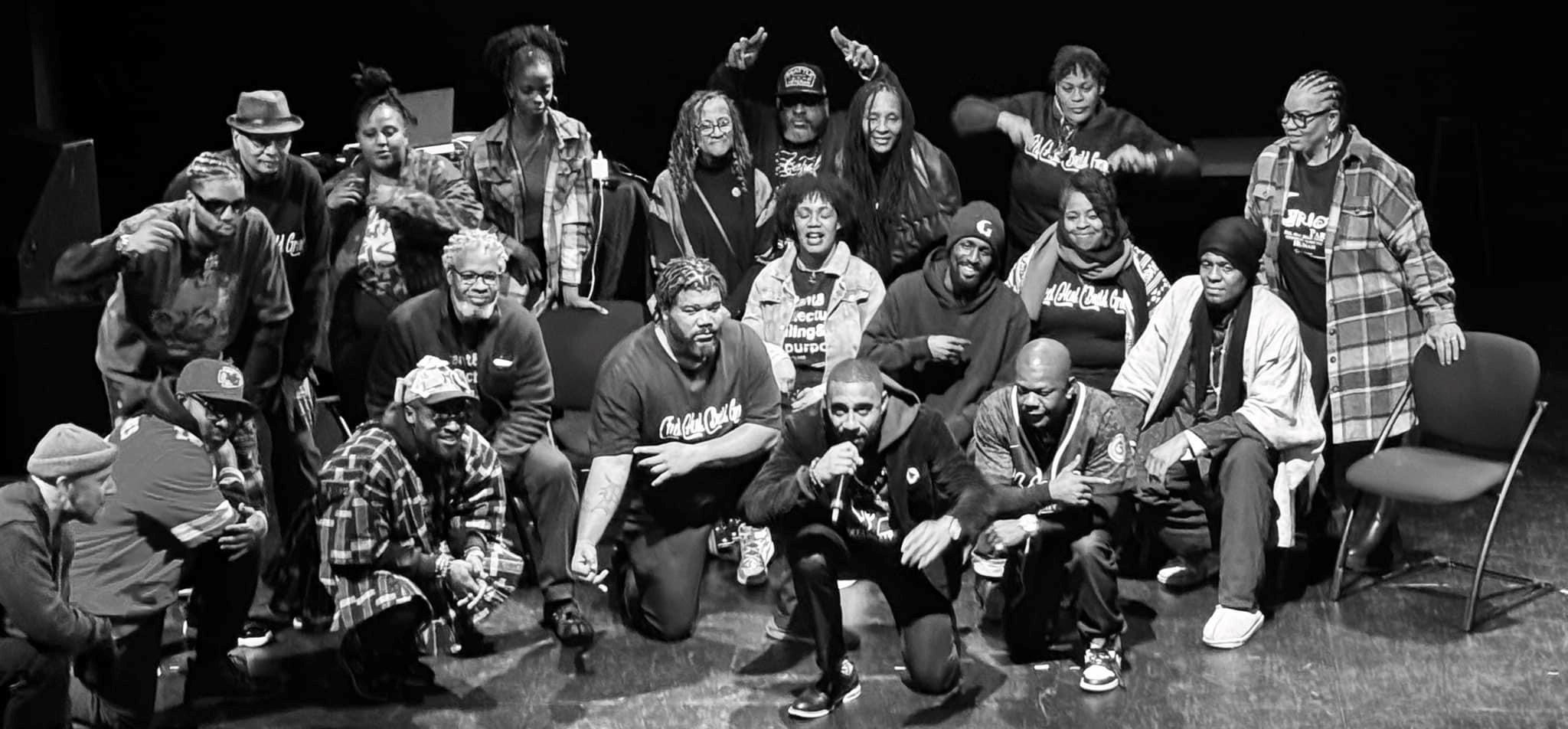
In celebration of Native American Heritage Month, we are hosting a series of profiles and stories to amplify and honor people, businesses, organizations, stories, and projects connected to Seattle’s Indigenous community.
Launched in July 2021, Daybreak Star Radio Network is Indigenizing the Airwaves through programming that focuses on language arts, education, storytelling, and music that connects Indigenous people to their heritage by strengthening their sense of belonging and significance as Native people. The station operates out of the Daybreak Star Cultural Center in Discovery Park. We recently sat down with Sherry Steele, Station Manager, Accountant, and member of the Peoria Tribe of Indians Oklahoma; Harris Francis, Program Director and Traffic Jam host; and Dominick Joseph, Intern, and Tulalip Tribe member to talk about the station, the binding power of music, and the importance of focusing on positive Indigenous stories.
Can you tell us a bit about Daybreak Star Radio and how it came to be?
Sherry: Our executive director [Mike Tulee] just came into my office and said, “We should have a radio station.” About a week later he just sort of magically met Harris! I love music, and Mike and I talk about music pretty regularly. So, it all just kind of happened very, very quickly. We started working on it in late March and had it on in July. Basically, we play 90 percent Native American music – America’s music, I guess. From end to end, not just the United States. We have artists from all the way up to Northern Alaska, the Yukon, and Greenland, then all the way down to Chile. We also have some Japanese and Australian tribal artists as well. We’re working on growing our collection of world tribal music.
Mixed into the other 10 percent are artists that specifically support Indigenous causes. We play people that are vocal and supportive, like Johnny Cash, he was a great ally. He wrote a whole album about supporting Native rights that he got really chastised for from the music industry, so we play that album in particular. Artists like Portugal. The Man. They aren’t Native, but they are super supportive of Native rights and Land Back. There are also some people who are doctoral-level musicians who have really studied Native instruments.
Why is having a radio station dedicated to Indigenous music and artists so important?
Sherry: From my perspective, I very much like that we have survived. It is so easy to focus on Native issues that are negative. There are a lot of them. But, as tribal members and as tribal nations, we’ve survived and we’re still here. We’ve done all kinds of things and don’t need to be defined by the negative stories that make the news. The music reflects that. Even Native hip hop has this level of optimism and moving forward as a people. I think that’s it. We just need to demonstrate that we’re here…. We’re all together and we can be together and work together. Because if we work together, all the tribes and all the reservations, we can actually push our agenda and what we want out into the world. Music is just one way to get in there. We all have music. Music is a binding force between all the tribes.
Dom: I think just having Natives in media is really important. We get to see that there are Natives on all platforms. Whether it is an artist taking a pen to paper, paint to a mural, music to a microphone, I think it’s just really important to have that for all Natives. I like to think that maybe there is a Native American high school student who is a musician and really wants to get their music out, and they can say, hey there is a radio station in Seattle playing Indigenous music. I fit that. That is for me. All I have to do is fill out a form. You can empower young people or adults. Anyone, however old they are, can become something that they want to become. It can really be a resume builder for young artists. They can get in here have a song played or even have a show and it can build confidence for going to larger stations or record labels.
Can you talk a little bit about the role of music in Native culture? How does having this space for Indigenous music help Natives maintain a connection to their culture?
Sherry: Every tribe basically has a song for everything we do. Whether it be sacred or ceremonial, or just walking through the woods. There are corn grinding songs, call and repeat songs for berry picking, all kinds of lullabies, healing songs, and honoring songs. You have to give respect where respect is due and be grateful, so there are lots of honoring songs. Every time there is an event like someone is born or someone dies, there is a song for that. It’s just ingrained. And they are stories. There is a long oral tradition and being able to share new stories is important as well. The drumbeats that you hear in Native music, or even rock or hip hop, that’s your beating heart or the steps of your foot on the earth. Music is everything.
Dom: It’s just like in a lot of cultures, music brings you together. Something as simple as having background music or having songs for occasions. Like berry picking songs, that is something we have for an activity we are doing together. To sing a song and do that together is special. I can’t speak for all the tribes out there, but I know that music is something that definitely brings people together.
What are your plans and goals for the future of Daybreak Star Radio?
Sherry: We currently have Android and iOS apps in the works that will hopefully be available soon. They will be free, so people can just download and listen to the station. We also have some big plans for next year and things we’re working on that we can’t really advertise yet but we are looking forward to.
Harris: We’ve got a lot of things coming up next year that we are really, really excited about. Like Sherry said, they aren’t quite ready, but keep checking in, they are really exciting. It’s also cool just looking at how the station has grown in the short time we’ve been running. Seeing the client engagement is also pretty amazing; from the Washington State Department of Health to Bill and Melinda Gates Foundation to a small business owner of a roofing company. That was our first client, just the owner of a roofing company who walked right in and gave us a check. We’re just at the cusp, just the start of our expectations. As we reflect on these first seven months and all the growth and enthusiasm, I’m so excited to look at the station down the road and all of the great things to come.
How can artists looking for radio play connect with you?
They can go on to our website at www.daybreakstarradio.com, there is a form to fill out. I encourage it every day on my shows. I know artists are always looking to get their songs played and reach more people. If they’ve been in the studio once or have 12 albums out. A lot of these artists can’t just walk into a station and get their song played. We believe that if it’s a good song, it doesn’t matter if they have five Instagram followers or 50,000 Instagram followers. If it makes sense for us to highlight them on our blog or social media accounts, we’ll do it. We’ve had artists come in here for interviews and we’ve offered them their own show. It just starts with enough courage to get your song in, get it reviewed, and get criticism.
To learn more about Daybreak Star Radio visit www.daybreakstarradio.com.


